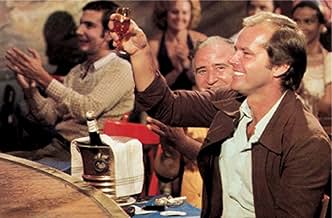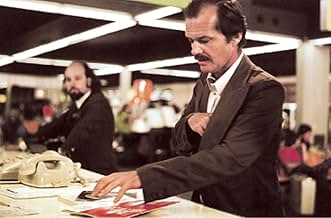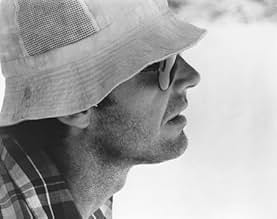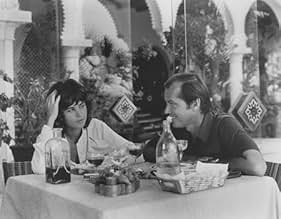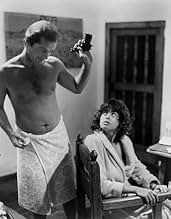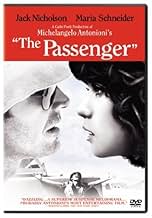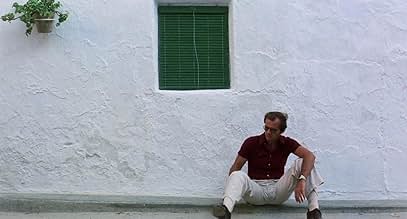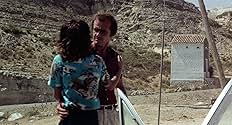Um correspondente de guerra frustrado, incapaz de encontrar a guerra que lhe foi pedido para cobrir, toma o caminho arriscado de apropriar-se da identidade de um conhecido traficante de arma... Ler tudoUm correspondente de guerra frustrado, incapaz de encontrar a guerra que lhe foi pedido para cobrir, toma o caminho arriscado de apropriar-se da identidade de um conhecido traficante de armas morto.Um correspondente de guerra frustrado, incapaz de encontrar a guerra que lhe foi pedido para cobrir, toma o caminho arriscado de apropriar-se da identidade de um conhecido traficante de armas morto.
- Direção
- Roteiristas
- Artistas
- Prêmios
- 5 vitórias e 2 indicações no total
- Robertson
- (as Chuck Mulvehill)
- Hotel Clerk
- (não creditado)
- Murderer's accomplice
- (não creditado)
- Cameraman
- (não creditado)
Avaliações em destaque
Despite its power and polemic against journalism, Professione: Reporter is also an understated movie from start to finish, made for a grown-up audience. Nothing is spelt out for you. However, the movie is strewn throughout with powerful and evocative visual clues, so it's nonetheless up to you as an attentive viewer to pick up (the early scene of Locke's Jeep getting stuck in the African desert sand, anyone?), or even soak them up unconsciously. As with all Antonioni, every shot in this movie is worthy of analysis and admiration. Bergman once said about the Italian that he could create some arresting individual images, but was incapable of stringing them all together in the sequence of a palatable movie: sorry Ingmar, old man - as much as I feel in awe of your craft, you're talking nonsense, here. However, I can't believe Antonioni once had the cheek to say he improvises each scene as he goes along (see his IMDb quotes page). There isn't a chance in hell these meticulously crafted, immaculately framed and composed movies are not also carefully premeditated. Clearly, Antonioni was trying to start a myth about himself along the lines of the one about Mozart composing his music straight onto the page, as dictated by God. In Professione: Reporter, I was especially in awe of the sequence involving the single long take from the window of Locke's last hotel room in an unnamed, dusty Spanish village. Regarding Maria Schneider, it truly is a shame she wasn't the star in a greater number of successful movies. Her ambiguity makes it very difficult to keep one's eyes off her when she's on screen. She looks like a cross between a boy, a girl and something cutely ape-like (I mean it in a good way!).
I would like to warn viewers of the inclusion of footage of a real execution - again, this was a film within the film. Personally, I found it very disturbing, which is why I'm mentioning it here.
Thirty years later, Michelangelo Antonioni's re-released "The Passenger" is looking very good, and so are Jack Nicholson and Maria Schneider, as the journalist who takes a dead man's identity in the Sahara and the girl he meets in Barcelona who decides to tag along. David Locke (Nicholson) takes the passport of a man named Robertson who he's had a few drinks with in a hotel. Before that we see Locke experience frustration, giving away cigarettes to men in turbans who say nothing, abandoned by a boy guide, dumping a Land Rover stuck in the sand. Later we see films that show as a journalist he was subservient to bad men. Locke has Robertson's appointment book which leads him to Munich, then various points in Spain. He learns Robertson was a committed man taking risks: he sold arms to revolutionaries whose causes he thought were just. He gets a huge down-payment.
Then Locke's wife gets a tape of him talking to Robertson and his passport with Robertson's photo pasted into it -- and she gets the picture.
Changing your identity and using someone else's isn't just an existential act, it's also a criminal one. Locke's gambit is hopeless: he winds up fleeing from himself. The film skillfully gives its action story an existential underpinning. The chase keeps up a rapid pace, like the Bourne franchise, but it has time to contemplate Locke's old and new lives in a metaphorical story he tells Schneider about a blind man that explains how he ends up.
Antonioni is great at little incidentals -- a girl chewing bubblegum, a man reciting in a Gaudi building. And at the end, people coming and going in a desolate plaza outside a bullfighting amphitheater. The locations provide exotic glamor. The camera-work of course is wonderful. In retrospect now one can see this was definitely a culmination for Antonioni. He thought it technically his best film. This is the director's preferred European version, originally released as "Professione: Reporter."
As with the director's most celebrated film, Blowup (1966), The Passenger also deals with the ideas of sight and perception, and with a character - in this case a writer/television reporter - who literally creates his own story as the film progresses. With these factors in places we have an absolutely fascinating piece of work; one filled with endless ideas of interpretation and reinterpretation as we look at the accumulation of character information and the vague scenes that seem to suggest the background of this character in relation to his decisions that come to inform the direction of the plot. With this, we again come back to that central notion of identity and how it governs our journey through life, with the earliest scenes showing Nicholson's character to be lost (both literally and figuratively) in a pensive, limbo-like existence and finding his way out of this torturous situation by attempting to step into the shoes of a completely different character (again, an idea expressed in both the literal and metaphorical sense of the term). These ideas are depicted through Antonioni's fantastic use of time and space, as he places Nicholson, first as an insignificant speck in the midst of the African desert, and then eventually against an ever changing backdrop of exciting and exotic European locales, to literally convey his lack of significance within the world that he inhabits.
Nevertheless, the real enjoyment of the film comes from the eventual realisation that this character makes on the nature of existence and his place within it, and how Antonioni suggests this through his typically rigid and starkly beautiful direction and the actual mechanisms of the plot. As ever with Antonioni's work, the narrative here is structured in a subjective and episodic manner, moving from one scene to the next while offering us snatches of information that we can collect and consider within the perspective of that penultimate scene that seems to put the rest of the film into a kind of context. The director also uses flashbacks and cutaways to scenes that we assume have some precedence over the journey that the character is taking, though again, it could just as easily be connected to the political climate that the film suggests through the documentary footage shot by Nicholson's character before his eventual self-imposed exile from himself. Here, the implication of the film's English title becomes clear, with the character of David Locke becoming a literal passenger in his own life; an empty vessel just drifting through existence with no real interaction, boxed in by the confines of a disintegrating marriage and tied to a job that is slowly sucking the very essence from his being.
Though the film is as minimal and subtle as many of Antonioni's earlier films, such as his grand cinematic gesture, the so-called "alienation trilogy", comprising of the films L'avventura (1960), La Notte (1961) and L'Eclisse (1962), the ultimate themes are incredibly affecting and heartbreaking in their finality; with Locke becoming the representation of the literal lost soul, a ghost in his own life who finds escape through imitation, only to end up reliving the same nightmare as if trapped within some endless loop. For me, it is easy to identify with the ideas here; with the central concept of remaking your own life as someone else entirely - or to live our lives from another perspective - coming back to the often mistaken belief that the grass is always greener on the other side. This notion is suggested throughout the film, from the first very meeting between Locke and the enigmatic Robertson, to that final scene between David and the mysterious girl, in which Locke relates the somewhat heartbreaking parable of the blind man who, after finally regaining his sight on the eve of his 40th birthday, is literally overwhelmed by what a terrible state the world is in.
Metaphors run rife through the film, from Antonioni's visual abstractions within the frame, to the subtle use of wordplay within the script. The ending then ties the whole thing together with a masterful display of technical virtuosity and one of the great, enigmatic questions of Antonioni's career. It is sad, mostly in the same way that the endings of La Notte and L'Eclisse were sad, suggesting a thread of resigned disappointment and the rejection of escape in favour of the easiest option. Ultimately though, the film is deeper, more affecting and more fascinating than any of this particular review might suggest; with Antonioni producing one of his very greatest films, aided by the excellent performances from Nicholson and Maria Schneider, and that continually evasive and hypnotic tone of wandering melancholy, as we move slowly towards that inevitable final, and one of Antonioni's boldest and most purely defined artistic statements.
"The Passenger will remain a film of the mid '70s, as one of Antonioni's previous films, Blow-Up, remains a film for and symbolises the '60s. It also contains one of Jack Nicholson's definitive performances (along with Chinatown, The Last Detail and One Flew Over The Cuckoo's Nest) and has, perhaps, been a trifle overshadowed by these films all emerging within a short period of time of each other and the enormous publicity and word-of-mouth they have generated. But The Passenger has proved itself a strangely durable film and, like Chinatown, one that will remain around for a long time, both in the consciousness of its admirers and, one hopes, constant revivals.
Antonioni's third English-speaking film, The Passenger, like Blow-Up and Zabriskie Point, centres around the oblique, unresolved aspects of life. In Antonioni's films - as in life - there are no easy answers, things are not tidied up, explained, sorted out.
So it is with The Passenger. Jack Nicholson is Locke, an outwardly successful television journalist, but he also is being eaten away by his own disillusionment with the job and the value of his interviews, and that general malaise that affects Antonioni's people. When the film begins, we find him on location in Chad where his jeep breaks down and gets bogged in the sand. Locke breaks down and collapses on the sand as the camera pans away over the strange but beautiful desert panorama.
We next see Locke, in an advanced state of exhaustion, struggling back to his hotel and a cool shower, and discovering that the man in the next room, who looks rather like him, has died. We are very conscious of the stillness in the hotel - the blue walls, a fly buzzing, the noise of the fan, Locke staring intently at the dead man on the bed. We hear their dialogue of the previous evening and the aural flashback changes to a visual one by some very neat editing. Locke changes rooms, passport photos and luggage, and finds it quite easy to take on a new identity. How desperate his need is can be judged by his conversations back in Europe with the free, liberated girl (Maria Schneider) he meets up with. ("I used to be somebody else, but I traded him in"). She, incidentally, is freer than Locke could ever be.
It transpires Locke has taken over the identity of a gun-runner, Robertson. Perhaps it is best not to go into the plot in too much detail. Best all round just to pick out some of the marvellous moments along the way to the final breathtaking conceit. There's Locke, back in London, daringly visiting his old haunts - delighting in being someone else, but of course he isn't. Later on he is suspended in a cable car high about the ocean his arms outstretched like a bird in flight. Later still, the girl asks him what he is running from, and he tells her to turn around and we see what she sees - the road behind them.
By now, we the audience are caught up in this mesmerising film and its deliberations of he mysteries of identity. We are now totally involved in Locke's plight. He has given up one identity for another and becomes more and more helpless as the situation gets out of his control. Finally, in a remote Spanish hotel he can go no further, either as himself or as his new identity, as his wife and the gun-runners close in on him. One shouldn't spoil the last sequence for those still to see it, but it shows the only real freedom from identity and self is in death. The final scene shows us the aftermath: as the sun goes down, the hotel-keeper comes out for a walk, a woman sits in the doorway resting. For some people, who do not question their existence, the continuity of life goes on.
Antonioni, now in his sixties, is one of the great Italian directors who, like Fellini and Visconti, burst upon the international film scene in the late '50s. His trilogy of Italian films, L'Avventura, La Notte and L'Eclisse, and his first colour film The Red Desert (all with Monica Vitti) contributed to the renaissance of the European cinema. Then he switched to his English-speaking films, of which Blow-Up was the first. He is as much a master of landscape as John Ford was in his genre. He thinks nothing of painting whole streets or trees to get the effect he wants. Blow-Up is the only film from the whole, crazy period of Swinging London films that has not dated and which encapsulates what it was really all about. It remains one of the great films. Like Bergman, Bunuel or Fellini you either respond to his vision or reject it totally. His images linger on in the mind, his work never dates."
That is what part of what I wrote in 1976 and The Passenger indeed remains endlessly fascinating and particularly so now that it is available again. Even at the Antonioni retrospective in 2005 it was not available to include in the season, but we did have cast members Jenny Runacre and Steve Berkoff there to speak warmly of it's making and importance.
Let's hope a new generation will discover its timeless appeal, and amazingly Antonioni now in his 90s is still with us, if rather frail. A 2005 short of his was shown last year on the great statue of Moses in Rome and was also in its own way fascinatingly mysterious.
Some may find the opening twenty minutes of the film, where there is virtually no dialogue, hard-going but this perfectly illustrates the sparse and confusing environment of the North African desert where the film begins. We are also treated to a marvellous scene between Locke and the man whose identity he later assumes where a tape recording and flashback are ingeniously merged into one and then separated again. Antonioni creates a mood that is almost indefinable throughout, a kind of hollow detachment which is exactly the perspective that Locke has on the world which has gradually worn him down yet the director still manages to conjure up power and simple romance between Locke and the girl he meets who is played by Maria Schneider. The film was not a hit at the box-office which is not surprising considering it's uncommercial style but artistically and cinematically it is a triumph of innovation.
Você sabia?
- CuriosidadesWhen Michelangelo Antonioni received his honorary Oscar in 1995, the Academy asked Jack Nicholson to present it to him.
- Erros de gravaçãoThere are a couple of inaccuracies in the displayed details of Locke's Air Afrique air ticket that was evidently issued in Douala, Cameroon in August 1974. The name of Fort-Lamy (Chad's neighboring capital city) became N'djamena in early 1973, and Paris is written in Italian ("Parigi") which would not have occurred in French-speaking Douala.
- Citações
The Girl: Isn't it funny how things happen? All the shapes we make. Wouldn't it be terrible to be blind?
David Locke: I know a man who was blind. When he was nearly 40 years old, he had an operation and regained his sight.
The Girl: How was it like?
David Locke: At first he was elated... really high. Faces... colors... landscapes. But then everything began to change. The world was much poorer than he imagined. No one had ever told him how much dirt there was. How much ugliness. He noticed ugliness everywhere. When he was blind... he used to cross the street alone with a stick. After he regained his sight... he became afraid. He began to live in darkness. He never left his room. After three years he killed himself.
- Cenas durante ou pós-créditosLeo, the MGM lion, which normally precedes the opening credits of MGM movies, has been supplanted by "BEGINNING OUR NEXT 50 YEARS". Leo then returns in the center with "GOLDEN ANNIVERSARY" on either side of it.
- Versões alternativasSeven minutes were added to the 2005-2006 re-release version, including a brief shot of a nude Maria Schneider in bed with Jack Nicholson in the Spanish hotel.
- ConexõesFeatured in Z Channel: A Magnificent Obsession (2004)
Principais escolhas
- How long is The Passenger?Fornecido pela Alexa
Detalhes
- Data de lançamento
- Países de origem
- Central de atendimento oficial
- Idiomas
- Também conhecido como
- The Passenger
- Locações de filme
- Fort Polignac, Algéria(desert scenes, setting: Chad)
- Empresas de produção
- Consulte mais créditos da empresa na IMDbPro
Bilheteria
- Faturamento bruto nos EUA e Canadá
- US$ 620.155
- Fim de semana de estreia nos EUA e Canadá
- US$ 24.157
- 30 de out. de 2005
- Faturamento bruto mundial
- US$ 769.503



